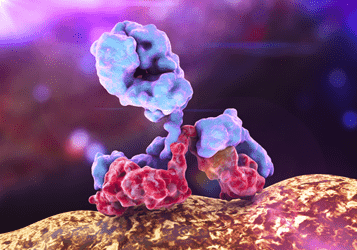- Home
- Products
- Customized ADCs
- CD22
- Anti-CD22 (Inotuzumab)-hydrazone-Calicheamicin ADC
Anti-CD22 (Inotuzumab)-hydrazone-Calicheamicin ADC (CAT#: ADC-W-338)
This ADC product is comprised of a Inotuzumab conjugated via a hydrazone linker to a Calicheamicin. The Calicheamicin is targeted to certain cancers by immunerecognition and delivered into cancer cells via receptor mediated endocytosis. Within the cell, Calicheamicin binds to DNA, causes DNA damage.
- ADC Target
- ADC Antibody
- ADC Linker
- ADC payload drug
- Name
- CD22
- Alternative Names
- CD22; CD22 molecule; SIGLEC2; SIGLEC-2; B-cell receptor CD22; BL-CAM; CD22 antigen; T-cell surface antigen Leu-14; B-lymphocyte cell adhesion molecule; sialic acid binding Ig-like lectin 2; sialic acid-binding Ig-like lectin 2;
- Target Entrez Gene ID
- 933
- Target UniProt ID
- P20273
- Overview
- CD22, or cluster of differentiation-22, is a molecule belonging to the SIGLEC family of lectins. It is found on the surface of mature B cells and to a lesser extent on some immature B cells. Generally speaking, CD22 is a regulatory molecule that prevents the overactivation of the immune system and the development of autoimmune diseases.
CD22 is a sugar binding transmembrane protein, which specifically binds sialic acid with an immunoglobulin (Ig) domain located at its N-terminus. The presence of Ig domains makes CD22 a member of the immunoglobulin superfamily. CD22 functions as an inhibitory receptor for B cell receptor (BCR) signaling. It is also involved in the B cell trafficking to Peyer's patches in mice.
- Overview
- Humanized Anti-CD22 Antibody, Inotuzumab
- Generic name
- Inotuzumab
- Species Reactivity
- Human
- Name
- hydrazone
- Description
- Acid-labile linkers, belonging to chemically cleavable linkers, are designed based on a pH-dependent release mechanism and remain intact during systemic circulation in the blood's neutral pH environment (pH 7.3-7.5) but to undergo hydrolysis and release drug once the ADC is internalized into mildly acidic endosomal (pH 5.0-6.5) and lysosomal (pH 4.5-5.0) compartments of the cell.
- Name
- calicheamicin
- Description
- Calicheamicin,produced by prokaryotic microorganisms, are a group of DNA cleaving agents with similar structure that binds in the minor grove of DNA in a relatively sequence-specific manner.
For Research Use Only. NOT FOR CLINICAL USE.
Related Products
- Anti-TGFB1 (Fresolimumab)-MC-MMAF ADC (CAT#: ADC-W-1798)
- Anti-EGFR (Futuximab)-MC-Vc-PAB-MMAE ADC (CAT#: ADC-W-1049)
- Anti-SELL (Aselizumab)-SPDB-DM4 ADC (CAT#: ADC-W-1749)
- Anti-C-kit-SMCC-DM1 ADC-6 (CAT#: ADC-W-074)
- Anti-SDC1-SPDB-DM4 ADC (CAT#: ADC-W-320)
- Anti-C-kit-CX1-1-DM1 ADC-2 (CAT#: ADC-W-078)
- Anti-CD79B (Polatuzumab )-MC-Vc-PAB-MMAE ADC (CAT#: ADC-W-2557)
- Anti-MS4A1 (Ocrelizumab)-SPDB-DM4 ADC (CAT#: ADC-W-1575)
- Anti-CD28 (lulizumab pegol)-SPDB-DM4 ADC (CAT#: ADC-W-2331)
- Anti-SLC3A2-DBM-MMAF ADC-2 (CAT#: ADC-W-548)
Published Data
+ Submit Publications

Scientific Resources
Customer Reviews and FAQs
There are currently no Customer reviews or questions for ADC-W-338. Click the button above to contact us or submit your feedback about this product.
Quick Links
Other Products
Same Target
Same Linker
Same Payload
| CAT# | Product Name | Linker | Payload |
| ADC-W-461 | Anti-CD22-AcBut-CalichDMH ADC-10 | AcBut (4-(4-acetylphenoxy)butanoic acid) | CalichDMH |
| ADC-W-2533 | Anti-CD22 (Pinatuzumab)-SPDB-DM4 ADC | SPDB (N-succinimidyl-4-(2-pyridyldithio)butyrate) | DM4 (N2'-Deacetyl-N2'-(4-mercapto-4-methyl-1-oxopentyl)maytansine) |
| ADC-W-2536 | Anti-CD22 (Pinatuzumab)-MC-Vc-PAB-DMEA-(PEG2)-duocarmycin SA ADC | MC-Vc-PAB-DMEA-(PEG2) | duocarmycin SA |
| ADC-W-2534 | Anti-CD22 (Pinatuzumab)-MC-MMAF ADC | MC (maleimidocaproyl) | MMAF |
| ADC-W-2528 | Anti-CD22-SPDB-DM4 ADC | SPDB (N-succinimidyl-4-(2-pyridyldithio)butyrate) | DM4 (N2'-Deacetyl-N2'-(4-mercapto-4-methyl-1-oxopentyl)maytansine) |
| CAT# | Product Name | Linker | Payload |
| ADC-W-423 | Anti-FUT3-hydrazone-doxorubicin ADC | hydrazone | doxorubicin |
| CAT# | Product Name | Linker | Payload |
| ADC-W-556 | Anti-EphA4-calicheamicin ADC | Calicheamicin | |
| ADC-W-008 | Anti-TPBG-AcBut-calicheamicin ADC-1 | AcBut [-(4' acetyl phenoxy) butanoic acid] | calicheamicin |
| WJY-0423-LS106 | Protein A-Calicheamicin ADC | Cleavable linkers | Calicheamicin |
| ADC-W-332 | Anti-CD22-AcBut-Calicheamicin ADC-7 | AcBut [-(4' acetyl phenoxy) butanoic acid] | calicheamicin |
| ADC-W-464 | Anti-CD33-AcBut-Calicheamicin ADC-5 | AcBut (4-(4-acetylphenoxy)butanoic acid) | Calicheamicin |
Online Inquiry
Welcome! For price inquiries, please feel free to contact us through the form on the left side. We will get back to you as soon as possible.



